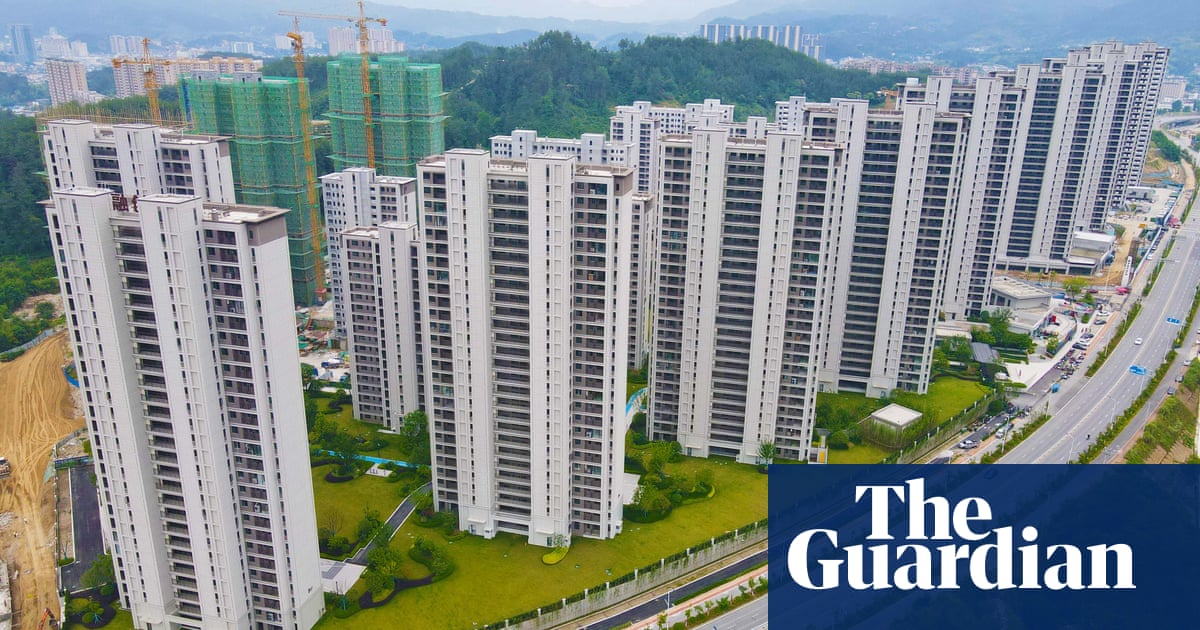- cross-posted to:
- worldnewsnonus@lemy.lol
- cross-posted to:
- worldnewsnonus@lemy.lol
The industry that has traditionally powered about a quarter of GDP has been in a downward spiral that policymakers have struggled to halt
All across China, from Beijing in the north, to Shenzhen in the south, millions of newly built homes stand empty and unwanted. There were nearly 391m sq metres of unsold residential property in China as of April, according to the National Bureau of Statistics. That is the equivalent of Manchester and Birmingham combined – and then some – sitting as vacant, unwanted property.
This glut of idle property has caused a headache for the government, shaken the world’s second largest economy and raised tensions over the purpose of housebuilding in a nation where property investment had been viewed as a safe bet.
Since the real estate sector was sent into a tailspin in 2020, caused by the pandemic and a sudden regulatory crackdown, the industry that has traditionally powered about one-quarter of GDP has been in a downward spiral that policymakers have struggled to halt.
The crux of the problem is that, with shaky faith in the economy and big property developers failing to deliver on paid-for apartments, potential homebuyers are keeping their money out of the market.



I’ve lived in Los Angeles for over 20 years, so I think I have seen what construction is like in California. And I have family in other states who work construction, so I also have an idea of how much stricter the building codes are here in CA (including how much stricter the building inspectors are). Almost everything you complained about is about workmanship or level of finish, not actual build quality. It might not be very sound proof, but it almost definitely won’t fall apart under normal use (there’s a reason that condo in Miami was such huge news). Also, if you are able to fall through a wall with 16" on-center studs and 1/2" drywall then you must be way more dense than I am, since I would have to run fast to get enough speed hitting shoulder first to break through, let alone a slow speed fall into a vertical surface. I’ve never been to China, so I can only repeat what I’ve heard that the quality is much lower than in the US.
As far as you rent vs buy example, you took the extreme case of Silicon Valley. Even in Los Angeles you can buy a single family home for $1.2M that rents for $6k/mo. You don’t even have to look at Detroit. Your example is also off. A 2b 1b apartment rents for $3700, but a condo of that size is $600k not $1.2M. And the mortgage on $600k is roughly $3200/mo plus $600/mo in taxes. If you look at single family homes, yes you are starting at $1.2M, but those are minimum 3br (or very large 2br) and absolutely not renting for $3700/mo. If you go away from the extreme case of SV and somewhere completely normal like the nice suburbs of Indianapolis, you can buy a small house for $300k that rents for $2000/mo.
https://www.zillow.com/homedetails/445-Bradley-Ave-San-Jose-CA-95128/19585003_zpid/
https://www.redfin.com/CA/San-Jose/445-Bradley-Ave-95128/home/731757
That was a whole lot of words to say “I don’t know what I’m talking about about.”
https://www.redfin.com/CA/San-Jose/1995-Sumatra-Ave-95122/home/1729649
https://www.rent.com/california/san-jose-houses/3-bedroom_2-bathroom?property-type=houses&bbox=-121.8580,37.3009,-121.8151,37.3520
I can link things too. The house you linked was last sold 40 years ago for $126k, so the person who owns it is renting it out for many times more than their mortgage. You might not be able to rent out a place for more than a mortgage today in that specific city, but if you own it for 5 years then you might be able to. Also, 2br 1ba single family houses in San Jose are fucking weird. If you start looking at 3br 2ba houses in that area then it gets a little more normal. If you look at 2br 1ba condos, the prices are also more normal. But you ignored what I said about Silicon Valley being an extreme case.
90% of the country you can buy for less than renting. You asked why anyone would rent when buying is cheaper. And the answer is because buying is hard. You need to have a lot of money saved up, which most renters can’t do. You need to be able to pay for repairs, which most renters can’t do. You need to know you aren’t moving jobs any time soon, which a lot of people don’t know. And nowadays you are bidding against corporations and investors who are bidding full cash, and sellers would prefer to do that instead of waiting on a mortgage approval that might fall through.
That’s because they’re not arguing in good faith.
Honey, the OP posted a house in what’s essentially the slums of San Jose. It’s sandwiched between a highway and an airport in an act of urban planning that would make Robert Moses weep with pride. Who’s not arguing in good faith?
The one who starts a comment with such a condescending tone. Honey, you seem like the bad guy here.
Aww honey, don’t be mad because you got proven wrong.
So… I take it you’re not from San Jose? Overfelt High is notoriously a highly minority-dominated, economically-disadvantaged, high-crime area. It’s next to the 101, segregated from the rest of the city, has obscene noise pollution, and, again, is notoriously economically-disadvantaged. You would not want to live there.
Edit: the fact that you would even link to that house shows how out of depth you are in this. That’s fine… I guess LA is an easier housing market to understand. Maybe the Bay Area is different, but you still should really not be linking random shit anyway. It shows that you’re willing to make arbitrary claims without sufficient knowledge on the issue.